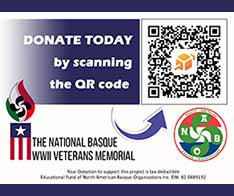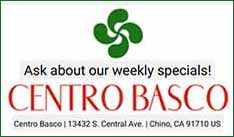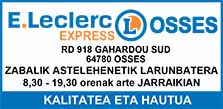Lisa Gavon, R-C Alpine Bureau. Whatever the truth is, the facts remain that if you are Basque, your life is marked by a powerful and compelling heritage. This enigma was deepened when a study showed that Basque people had the highest percentage of the rare "O" Rh negative blood than any region on the planet.
"Every report I ever wrote in school was always about being Basque," Anita Izoco stated. It was not only because she and her family were proud to be Basque, it was also because it was the most fascinating topic she knew. In every area: politics, religion, fashion, cuisine, art, music, dancing, community, there is something unique and innovative. It was ingrained in Anita that part of being Basque was working hard, being conscious of your contributions, and doing a good job wherever you found yourself.
Translated "Euskera" means "the language that Basque people speak." Although researchers are still attempting to find a linguistic relative of Euskera, it is currently considered a language isolate that does not belong to any of the Indo-European family of languages that surround it. The Basque homeland is a mountainous region containing seven provinces straddling the borders of France and Spain in the rugged Western Pyrenees range along the coast of the Bay of Biscay.
In the Basque homeland on Valentine's Day 1921, Jean Zubillaga came into this world. He served in the French army and immigrated to Reno in 1948. He followed jobs throughout California and Nevada, first herding sheep, then working in hotels, on ranches, and in lumber mills.
Jean's uncle owned the Santa Fe Hotel in Reno. While working there he met his bride-to-be Emilia Diaz in August 1949. They were married three months later, staying in Susanville where Jean worked for the lumber mill. They had three children: Anita, Raymond, and Teresa. In 1970, they purchased the Sierra Motel and relocated to Carson Valley becoming part of the thriving Basque population here.
Their oldest daughter Anita Zubillaga was born into the vibrant community of Basque descendants in Susanville. She spoke only Basque when she entered kindergarten, but quickly picked up English. After high school, Anita went to live in San Francisco at a girl's residence. While working for the FBI, she would visit a family who owned the Basque boardinghouse where she eventually met her husband Jean Pierre Izoco. They were married in 1970 at Saint Francis of Assisi Church.
Anita's husband, Jean Pierre, was born in the Basque homeland and completed his apprenticeship as a baker before coming to the United States. Having lost his father when he was only two and his mother when he was 13, his oldest brother had filled the role of parent for him, and his other brothers had immigrated. He herded sheep in California, ran a camp kitchen in Wyoming, and finally came back to bake pies, cakes, and bread in Sonoma. It was when he moved to San Francisco to work for a French bakery that he met his wife Anita. Always dedicated, in addition to his full-time job, he started his own gardening business.
Jean Pierre and Anita have three children: Aline, Caroline, and Roger. The children were ages 3, 4, and 5 when they bought the Sierra Motel from Anita's parents. Those were tough years, since running the motel was a 24 hour job, and Jean Pierre also worked in the sawmill. After 13 years, they hired a manager, became responsible only for supervising, and life got better. Anita's sister Teresa and her family ran the Star Hotel in Elko, Nevada from 1989 to 2003, then bought the Sierra Motel in 2005. After a decade, it was eventually sold out of the family.
Since they were used to so many Basque centered functions and gatherings in San Francisco, before moving to Gardnerville Jeanette Fernandez and Anita went through the phone book and sent letters to every possible Basque surname. They invited them to join in creating a group. This is how the Mendiko Euskaldan Cluba (roughly translated "Basques of the Mountains") was formed.
The Museum Committee from the Cluba was responsible for putting together the remarkable book: From the Basque Country to the Sheep Camps of the Carson Valley: The Personal Stories of Basque Immigrants. It is an illuminating read, highlighting hardships overcome, adventures experienced, and happy times lived. You can purchase this book from the JT Basque Restaurant or directly from the Basque Club at ajizoco@charter.net. Look for the insightful quote documenting Jean Pierre's outlook: "He feels he has a very good life, and is grateful to his new country for the opportunity. His life was not always an easy one, especially losing his parents so young, and life in the United States could, at times, be difficult, but he has no regrets. All these things have helped him appreciate the good in his life." A sentiment that is beautifully said.
A cornerstone of Basque hospitality, the long table surrounded by many chairs emanates warmth and welcome. Emilia Zubillaga remembers that as she was growing up this table hosted strangers as well as kin. As it is today, platters were filled to the brim with delicious, sustaining recipes passed from generation to generation, served family style. If there is an accordion, it becomes an official party. Music and dance in traditional costumes are highly valued. Basque men can still be seen wearing a time-honored black beret, each with their own signature style.
Out of the many Basque symbols and traditions, perhaps the "Lauburu" or Basque Cross is the most well-known. The Labaru is tied to the natural world, representing the sunlight that drives away darkness and evil. It is considered a symbol of prosperity, not just in a monetary sense, but in all areas: the love of your family, good health, being surrounded by the beauty of the mountains and rangelands, and the inspiration of music, art, and dance. This deep appreciation and dedication to their family, community, and heritage in every aspect of their lives are what the Zubillaga and Izoco families have manifested here in Carson Valley.



 Lagun bati bidali
Lagun bati bidali Komentarioa gehitu
Komentarioa gehitu








